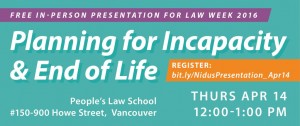Clicklaw at the first Canadian Twitter Town Hall with #AskChiefJudge

The BC Provincial Court — a Clicklaw contributor — made history last Thursday as the first court in Canada to hold a Twitter Town Hall.
Everyone was invited to participate by tweeting questions to the Provincial Court’s Chief Judge Crabtree using the hashtag #AskChiefJudge or by sending an email prior to the event. The Chief Judge tweeted 100 direct replies in response between 1-3pm on April 14th, BC Law Day.
As the Provincial Court eNews notes, the event was promoted by “[t]he communications team of the Canadian Bar Association BC Branch…as part of BC Law Week. They, and the BC Law Society, Trial Lawyers Association, Courthouse Libraries BC, Clicklaw, Justice Education Society, Legal Services Society, Mediate BC, Access Pro Bono, Access to Justice BC, and Nidus joined the conversation, adding helpful information.” Thank you as well to all Clicklaw contributor organizations and Clicklaw visitors and users for participating!
News of the event made waves online:
- March 29, BC Provincial Court website announcement
- March 29, Clicklaw Blog, LawMatters Blog, CBABC News announcement
- March 31, The Province, Keith Fraser, B.C.’s Chief Judge to hold Twitter town hall, believed a first in Canada also cross-posted in Regina’s Leader News
- March 31, Vancouver Sun, Ian Mulgrew, Provincial Court Chief Judge taking to Twitter
- March 31, Prince George Citizen, Chief judge to host Twitter town hall
- April 1, Courthouse Libraries BC, Stream Post
- April 12, Colin Lachance, Slaw.ca: #AskChiefJudge – B.C. Provincial Court Twitter Town Hall
- April 12, Times Colonist, Provincial court chief judge to host town hall on Twitter
- April 14, Roundhouse Radio 98.3 Vancouver, Chief Judge Crabtree on Our City with Kirk LaPointe
Following the Town Hall, reflections on the event’s success:
- April 14, The Canadian Bar Association, BC Branch created a Storify with some highlights from the event, as did UVic Law Professor and Associate Dean Gillian Calder here.
- April 14, Vancouver Sun, Ian Mulgrew: Chief Judge hashes issues out on Twitter for first time
- April 15, David Bilinsky, Slaw.ca: World First – Twitter Town Hall With Chief Judge Crabtree
- April 17, Colin Lachance made a Netlytic visualization of the Twitter Town Hall which according to Colin “has all details associated with 694 uses of [the #AskChiefJudge] hashtag beween [April] 8th and 17th, about half of which came during the 2 hour town hall, each line is a tweet linking 2 people through metions, RTs, likes to show influence.”
- April 18, Nate Russell, Slaw.ca: Of Tweeters Laureate and Judicious Public Outreach
- April 19, BC Provincial Court eNews: A First for BC Provincial Court



